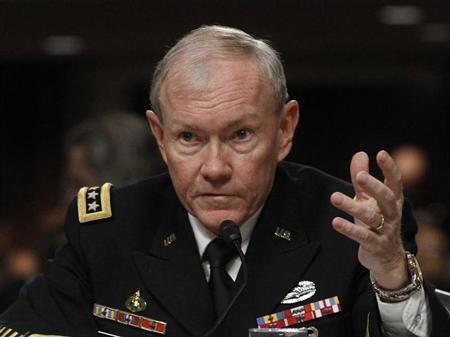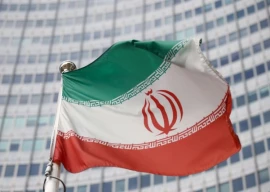
“We are gradually rebuilding our relationship as reflected in the recent signing of a tripartite border document to standardise complementary cross-border operations and will continue to do so with Pakistan’s new leadership following its historic election last month,” Chairman of the Joint Chiefs Staff of the US military Gen. Martin Dempsey said.
Appearing before the US Senate Committee on Appropriations, Dempsey acknowledged that a defeat in Afghanistan would have fallout for Pakistan and the region.
The General recalled that when he appeared for a testimony last year, the effects of the November 2011 border incident with Pakistan were still fresh, and tensions were as high as any time since the Osama bin Laden raid but things improved through bilateral engagement.
“Measured, but steady civilian-military engagement with Pakistani leadership led to the reopening of the Ground Lines of Communication in July 2012,” he noted.
When Senator Lindsey Graham asked Dempsey what would happen if the United States-led allies lose the conflict in Afghanistan, the military officer cited a number of possible implications.
“Well, the region will become unstable. Our—I think there will be problems on Pakistan’s border. Iran will be encouraged to become even more regionally aggressive ------ we could find a re-emergence of violent extremist groups.”
However, he stressed that the US is winning in Afghanistan.
Dempsey noted that the difference between winning and losing is certainly what the US-led allies do between now and the end of 2014 “but also, I think, the commitment we make beyond.”
COMMENTS (15)
Comments are moderated and generally will be posted if they are on-topic and not abusive.
For more information, please see our Comments FAQ
1732071267-0/lana-(2)1732071267-0-405x300.webp)
1727242355-0/Diddy-(1)1727242355-0-165x106.webp)

1732063440-0/elon-(3)1732063440-0-165x106.webp)













@US CENTCOM: If you are true,sincere and honest on your this stance and if you respect and honor Pakistan's sovereignty practically,sincerely and honestly then why don't you end/stop drones' strikes on Pakistani tribal areas which are the causing of more terrorism and insecurity in Pakistan???? Please at least now stop your this hypocritical attitude,double-standard and dual-faced policies regarding Pakistan because we Pakistanis have seen your real face and intentions about/for Pakistan and you US can no more fool and deceive us further......
Dear SM,
Our sacrifices in the region prove our stance against terrorism. We share a common goal with Pakistan and Afghanistan in regards to restoring peace in the region. Our nations have felt the impact of terrorism, and therefore, we are working together to combat the common threat of terrorism. We have always acknowledged Pakistan’s sacrifices in the region. It is no secret that Pakistan continues to feel the wrath of terrorism at the hands of homegrown insurgents. These same terrorists see our nations as a common threat to their evil objectives. And that’s the reason we’ve been emphasizing shared cooperation between our nations. These terrorists regularly target our forces on both sides of the border, and it makes no sense to indulge in the blame game, especially when we are working towards a common goal of stabilizing the region. We want to leave behind a safe and secure structure for Afghanistan to prosper. The progress shown by the ANSF (Afghan National Security Forces) promises a bright future for the nation of Afghanistan. We will continue to work for the betterment of the region, and hope to remain unified in regards to our common objectives.
Ali Khan
Pakistan has set its own course. No one has forced Pakistan to do anything. Pakistan has pro fitted greatly and done a lot to keep conflict going in the region. Pakistan has also lost a lot of economic progress over the years. The problem with Pakistan is it prides itself in senseless proxy wars that hurt Pakistan more than anything.
America does not like instability. America has been conditioned to fear the resurgence of international terrorism. America does not like to lose wars. America does not like to fight long wars. America does not like to commit troops unless deemed absolutely critical to national security.
Stop the violence and America will leave. America left a country with the second largest boil reserves in the world. A country in Iraq it spent over 3 trillion dollars on. Left it for the Chinese to move in without thinking about it twice.
Democratic Administrations do not like occupations. Barack Obama was a golden opportunity for Pakistan. He still is. Pakistan should have helped decrease violence in the aftermath of then surge. Obama would have claimed victory and would have had to defend that declaration with massive withdrawal.
Instead Pakistan wants to beat the same dead horse with the same militants. Stop sending a veritable arm of proxy assets and they will leave. Even the Taliban don't see themselves capable of governing or controlling the public if they come to power. Something that is no longer possible with a much stronger north in the first place. So what is Pakistan hoping for? America will leave if you let them.
@Parvez Amin:
Who told you this? In actual fact, most of America's wars driven by trade.
@Mirza: I can only say your ill informed. Taliban has 80% control in Afganistan, that is why Americans are negotiating with them. And since Pakistan has good relations with Taliban we will have a more secure border like pre 9-11/
Peace comes through trade, not military moves to grab what belongs to others. People who devote their lives to military careers and military thinking are arguably not inclined to creating peace. Why not? If there were peace, then they would have to work for their living and again arguably, that is not something they enjoy doing. So as long as we have armed forces, statements like the good general made, will be inflicted on us. My advice? Ignore what he says. He is just trying to make sure his job continues and he can continue to play in real, the violent games he enjoyed as a child. If you want America out or this area, open up the trade routes so that they can pay for what they want.
"Mending" ties between an elephant and a mouse !! At-least our powers-to-be can puff their chest and talk of equality !!
They seem to be setting up pre-text for staying beyond 2014. Speculations with regards to regional de-stabilization and aggressive Iran will provide the justification for the extended stay. I find specially interesting the reference to 're-emergence of violent extremist groups'. As if now, they are not breathing down our necks.
Regardless of whether a pullout is good or bad in the American opinion, they have got to go. Foreign forces have no reason to be in Afghanistan and this region.
The Americans and their cohorts have created massive instability in Pakistan due to their presence and the presence of several other unwanted agencies who main purpose was only to create instability in this region and to dominate the region due to their military preponderance.
Safe Exit, we want safe exit please.
This statement would set aside the rumors that the US is running away. They are scaling back and would still have firm control over the region. They would not let all their sacrifices go to waste. The propaganda of rag tag brutal extremists is baseless and the US is not running away for good. The Taliban have not made a major offensive in several years and for guerilla war one does not need well over hundred thousand troops. In short there is no light at the end of the long tunnel for the extremist jihadists.
There are three main different languages spoken through out the world.
The first one is "Military" language.
The second is "Diplomatic" language.
The third and the last one is "Plain Words" language.
General Matrin Dempsey is talking in "Military" language.